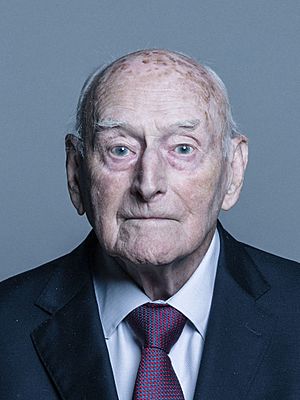Terence Higgins, Baron Higgins facts for kids
Quick facts for kids
The Lord Higgins
|
|
|---|---|

Official portrait, 2018
|
|
| Financial Secretary to the Treasury | |
| In office 7 April 1972 – 4 March 1974 |
|
| Prime Minister | Edward Heath |
| Preceded by | Patrick Jenkin |
| Succeeded by | John Gilbert |
| Member of Parliament for Worthing |
|
| In office 15 October 1964 – 8 April 1997 |
|
| Preceded by | Otho Prior-Palmer |
| Succeeded by | constituency abolished |
| Member of the House of Lords Lord Temporal |
|
| In office 28 October 1997 – 1 January 2019 Life peer |
|
| Personal details | |
| Born | 18 January 1928 London, England |
| Died | 25 November 2025 (aged 97) |
| Political party | Conservative |
| Alma mater | Gonville and Caius College, Cambridge |
| Sport | ||||||||||||||
|---|---|---|---|---|---|---|---|---|---|---|---|---|---|---|
| Sport | Athletics | |||||||||||||
| Club | Herne Hill Harriers | |||||||||||||
|
Medal record
|
||||||||||||||
Terence Langley Higgins, also known as Baron Higgins, was a British politician and a talented athlete. He won a silver medal for England at the Commonwealth Games. He also competed in the 400-meter race at the 1952 Summer Olympics. Lord Higgins was a member of the Conservative Party. He was born on January 18, 1928, and passed away on November 25, 2025.
Contents
Who Was Lord Higgins?
Terence Higgins led a life of remarkable achievements. He excelled in both sports and public service. His journey took him from Olympic tracks to the halls of the British Parliament. He dedicated many years to serving his country.
Early Life and Athletic Achievements
Terence Higgins was born in London on January 18, 1928. He attended Alleyn's School in Dulwich. Before his studies, he served in the Royal Air Force from 1946 to 1948.
He was a gifted athlete, especially in running. He represented Great Britain in the Olympic Games twice. First, he competed in London in 1948. Then, he participated again in Helsinki in 1952.
In 1950, he achieved a significant sporting success. He won a silver medal for the England athletics team. This was at the British Empire Games, held in Auckland, New Zealand.
From Sports to Studies and Work
After the 1948 Olympics, Higgins moved to New Zealand. He worked there for a shipping company for several years.
Seven years later, he returned to Britain. He decided to study economics at Cambridge University. While at Cambridge, he became the President of the Cambridge Union. This is a famous debating society for students.
After finishing his studies in 1958, he taught economics for a year. He was a lecturer at Yale University in the United States. Later, he worked as an economist for a large company called Unilever.
A Distinguished Political Career
Terence Higgins had a long and impactful career in politics. He was elected as a Member of Parliament (MP). An MP represents a local area in the UK Parliament.
Serving in Parliament
He represented the town of Worthing from 1964 to 1997. That's over 30 years of service to his constituents.
From 1972 to 1974, he held an important government role. He was the Financial Secretary to the Treasury. This meant he helped manage the country's money and economic policies.
Important Roles
In 1979, he became a Privy Councillor. This is a special honor given to senior politicians. It means they advise the monarch.
He also served on important committees in Parliament. These committees helped review government work and policies. He even chaired the Treasury Select Committee for many years.
Joining the House of Lords
After leaving the House of Commons, he became a "life peer" in 1997. This meant he was given the title Baron Higgins. He then became a member of the House of Lords. The House of Lords is the second chamber of the UK Parliament.
In the House of Lords, he continued his political work. He was a spokesperson for his party on topics like work and pensions.
He also received a high honor in 1993. He was made a Knight Commander of the Order of the British Empire (KBE). This recognized his great service to the country.
Lord Higgins retired from the House of Lords on January 1, 2019.
Family and Legacy
Terence Higgins was married to Dame Rosalyn Higgins. She was also a very accomplished person. She served as the President of the International Court of Justice. This is a major court that settles disputes between countries. They had two children together.
Terence Higgins passed away on November 25, 2025, at the age of 97. He is remembered for his dedication to both sports and public service.
 | Shirley Ann Jackson |
 | Garett Morgan |
 | J. Ernest Wilkins Jr. |
 | Elijah McCoy |

